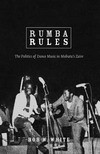
Rumba Rules: The Politics Of Dance Music In Mobutu’s Zaire
Bob W. White
Duke University Press
$23.95
paper
300pp
978-0-8223-4112-3
This came in handy when the copper economy crashed. The lower the GDP dropped, the more the president liked being seen with popular musicians and being boosted by them in song, in return for bribes and not getting beaten up. That’s how Mobutu inspired a new Congolese genre: the libanga, a lyric composed of the names of people who pay musicians to mention them. This instance of pop’s perversion by power is Exhibit A in Rumba Rules‘ argument that the Zairian music industry took its moral cues from the government.
White, an anthropology professor at Université de Montréal, studied the industry from the inside by landing a gig on insecticide-can maracas in a Kinshasa dance band. The book’s liveliest chapters analyze the band in rehearsals and in performance. The author, who is also an amateur guitarist, convincingly explains how Congolese pop works and what makes it special. And if you think reading about music is a way of not getting it, at relevant points White directs you to a website with audio and video links. (At the time of reviewing – two months after the book’s release – the site was still under construction.)
Along with the lively chapters, there are long stretches of libanga frequency analysis and other varieties of unlively evidence-assembly. Academic writing is about accountability, not readability, so any narrative dash that does occur should be enjoyed as a happy accident, like discovering money in a drawer while looking for your keys. The rest must be taken as found; though the book’s frequent reiterations of theme suggest material written as lectures and not recast for print as thoroughly as it might be.
As a pioneering study of its subject, Rumba Rules justifies itself amply by laying out what it knows. But – possibly because academia is an organism that eats facts and produces systems – it then reaches beyond the known for a conclusion that may not be attainable. White says popular music and politics acted together to reinforce authoritarian rule. Now, how much any musician can affect the times is an open question, and while the times’ effect on Congolese music is demonstrated, the official influence remains shadowy. If the book claims the government “systematically” impoverished the music industry (to spice up the bribes), its evidence suggests something more complex and less planned.
It may be that Mobutu never had a plan that worked, beyond one for diverting Zaire’s treasury into his personal Swiss bank account. He was the kind of narcissist who credits the rest of humanity with as much free will as a piggy bank, and doesn’t have a fixed personality of his own so much as a style that adapts to the situation to be exploited. Such an individual can hardly have a politics – even when he’s operating on a national scale – never mind a study of dance music and politics that can account for him. mRb






0 Comments